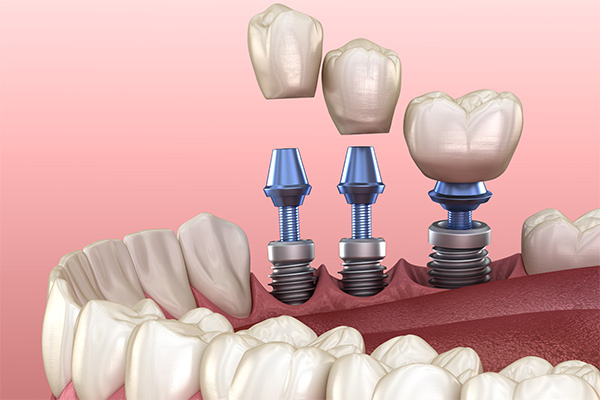 Dental implants are a popular option for replacing missing teeth. While they offer the same aesthetic benefits as other replacement options, there are multiple other benefits provided by dental implants that alternatives fail to deliver.
Dental implants are a popular option for replacing missing teeth. While they offer the same aesthetic benefits as other replacement options, there are multiple other benefits provided by dental implants that alternatives fail to deliver.
Behave like natural teeth
One crucial component of a dental implant is a titanium screw that is placed directly into the jawbone. The screw forms a permanent bond with the surrounding bone, acting similarly to a natural tooth’s root. This provides a stable foundation for the implant, allowing for the natural, unrestrained mouth and jaw usage that some other options for replacing missing teeth may not offer.
In addition to more comfortable and everyday usage, dental implants require the same oral hygiene practices as natural teeth. There are no special flossers, tablets, or other steps required outside of regular oral hygiene practices, making them a low-maintenance and easy option for tooth replacement.
Offer many health benefits
A key concern with missing teeth is that when the gap from a missing tooth is left open for an extended period, it can cause adjacent teeth to shift and result in a lack of stability. Dental implants, as well as some other replacement options, can solve this crucial issue. However, dental implants solve problems that other options do not address and can help prevent problems with additional options for replacing missing teeth.
When the root of a tooth is removed from the jaw bone, the bone doesn’t receive the stimulation needed to signal that the bone is necessary. Often, this causes reabsorption of that section of bone back into the body. The effect is a decreased amount of bone mass and a weakened area of the jaw bone. This can lead to problems for adjacent teeth and even a change in facial structure and physical appearance. Dental implants are the only option for replacing missing teeth surgically placed into the jaw bone, acting similarly to a natural tooth’s root by creating stimulation and preventing this decrease in bone mass.
Gum health can also be a concern when replacing missing teeth. Dental implants allow the gum to grow naturally around the false tooth. This helps prevent food and bacteria from becoming trapped around and below the appliance, preventing additional oral health concerns which can accompany other replacement options.
Another health concern when looking at options for replacing missing teeth is the damage that a replacement will cause to adjacent teeth. Other options may require adjacent teeth to be ground down to have crowns fitted or have false teeth bonded directly to the tooth's natural surface. Dental implants serve as an individual tooth structure, preventing any need for support, and therefore damage to adjacent teeth.
Implants can last a lifetime
Some options for replacing missing teeth are semi-permanent solutions, with future replacement often necessary. Dental implants are a permanent solution that requires minimal maintenance as long as proper oral hygiene is kept, making them an easy solution for missing teeth.
Related Posts
If you are missing several teeth or all of your upper or lower teeth or even all the teeth in your mouth, you may be wondering, “What are my options for replacing missing teeth?” Full or partial dentures may be a good option for you. In this article, we’ll discuss what makes a good candidate…
Missing teeth can result from many different things; regardless of how you lost your teeth, there are options for replacing missing teeth. There may be a stigma around dental care breaking the bank, but these options all have their pros and cons, which you should take into consideration.One option many consider is doing nothing. While…
Dental implants are a newer option for replacing missing teeth. They involve a titanium screw inserted into the jawbone, and then months later, once the jawbone has healed and the screw is fused into the bone, a crown is attached to the screw.It can be expensive to get dental implants, but since they offer full…






